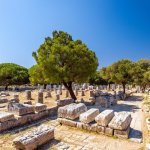Vangelis
Active member
Hi fellow travellers, I have not been able to get back to Greece for a few years due to COVID. The Australian borders are still closed but I'm hoping I will be able to travel back to Greece in 2022 for the summer. In preparation, I have fully vaccinated and have received my COVID-19 Certificate. The certificate has my name, date of birth, document number, healthcare identification number and date of my vaccinations, what type of vaccination I had (AstraZeneca for me) and a statement that I have had the full course of vaccination doses (all in english). However, I see on the news that Greeks have a vaccination certificate with a QR code but my certificate doesn't have that.
Does anyone know if my certificate will be valid for travel into Greece and for use at public events and restaurants? Has anyone travelled to Greece with a similar certificate and what was your experience? I am getting a bit anxious about this as I want to travel next year and don't want any issues when I get to Greece. Any information would be appreciated.
Does anyone know if my certificate will be valid for travel into Greece and for use at public events and restaurants? Has anyone travelled to Greece with a similar certificate and what was your experience? I am getting a bit anxious about this as I want to travel next year and don't want any issues when I get to Greece. Any information would be appreciated.



